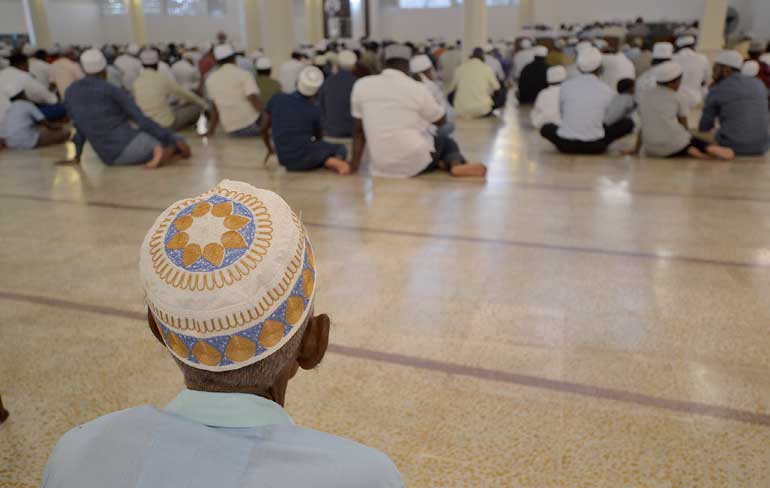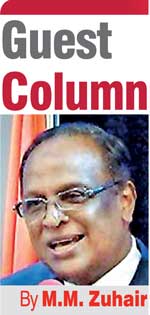Sunday Feb 22, 2026
Sunday Feb 22, 2026
Tuesday, 1 June 2021 00:59 - - {{hitsCtrl.values.hits}}

The anti-Muslim perceptions disproportionately created in the public mind from the imbalanced media coverage of the Easter attacks over the past two years appear to be erasing the memories of the under-publicised patriotic roles played by the community in the course of the 30-year war as well as the advance warnings given years prior to the Easter attacks – Pic by Shehan Gunasekara
 Twelve years since the end in May 2009 of the 30-year war on separatist terrorism and two years following the April 2019 Easter Sunday attacks, the need has presently arisen for the Muslims to articulate the community’s contributions primarily for ending LTTE terrorism and then to remind the country of the advance information given by the community that could have prevented the Easter terror attacks, not simply because no one today is talking about these contributions, but because the anti-Muslim perceptions disproportionately created in the public mind from the imbalanced media coverage of the Easter attacks over the past two years appear to be erasing the memories of the under-publicised patriotic roles played by the community in the course of the 30-year war as well as the advance warnings given years prior to the Easter attacks.
Twelve years since the end in May 2009 of the 30-year war on separatist terrorism and two years following the April 2019 Easter Sunday attacks, the need has presently arisen for the Muslims to articulate the community’s contributions primarily for ending LTTE terrorism and then to remind the country of the advance information given by the community that could have prevented the Easter terror attacks, not simply because no one today is talking about these contributions, but because the anti-Muslim perceptions disproportionately created in the public mind from the imbalanced media coverage of the Easter attacks over the past two years appear to be erasing the memories of the under-publicised patriotic roles played by the community in the course of the 30-year war as well as the advance warnings given years prior to the Easter attacks.
The community never sought remembrances but sadly now, the need has arisen! The Easter attack terrorists who killed 269 and injured close upon 500 innocent Christians, tourists and others may deserve the anti-Muslim conversations but certainly not the Muslim community. We need to remind the country, at least at times when the country is remembering the supreme sacrifices made by the armed forces, that we too have played our patriotic part.
Massacre of Muslims
August and October are months in each year that the nation must be made not to forget, how and why in 1990 alone over 1,000 innocent Muslims of the east were targeted and murdered; in addition 90,000 Muslims were expelled from the north and why we all loved the end of LTTE terrorism as well as all other forms of terror. Independent intellectuals and journalists of the Sinhala and Tamil communities did echo sympathetically the crushing bitter feelings of the terrorised Muslims. But now the Muslim contributions for protecting the territorial integrity of the country appear to be forgotten.
Let’s get down to the brass tacks. According to the figures of the University Teachers for Human Rights (UTHR-Jaffna), on 12 July 1990 at Kurukkalmadam the LTTE killed 68 Muslims from nearby Kattankudy in the Batticaloa District of the Eastern Province; on 3 August 1990 the LTTE killed 147 Muslims who were at worship in four Mosques in Kattankudy; on 5 August 1990 and on 6 August 1990, Muslim farmers 17 and 33 in numbers, working in paddy fields were killed by the LTTE and on 12 August 1990 in Eravur, 18 km to the north of Kattankudy another 121 Muslim, women and children, while sleeping in their homes, were cut, chopped and axed to death by the LTTE, fighting for a separate state in N-E Sri Lanka. Jaffna-based UTHR was headed by Dr. Rajan Hoole.
The total number of Muslim civilian lives destroyed by the LTTE within those terrorising 32 days was 386, of which around 250 were from and around Kattankudy, the epicentre of unprovoked massacres of unarmed Muslim civilians. Zahran Hashim and Moulavi Niyas were both from Kattankudy, young boys at the time of the massacres. They must have seen the dead bodies in the four Mosques and the mass burial of 147 of their kith and kin including their mates from schools and madhrasas.
Easter Sunday Commission’s blunders
Why did the Easter Sunday Commission ignore the possible links of the NTJ leader Zahran Hashim and the disputed ‘Maha-mola-karuwa’ Moulavi Niyas to the Kattankudy LTTE massacres? If indeed Niyas Moulavi was the ‘mastermind’ behind the Easter attacks, then there emerges the strong possibility of radicalised links between the Kattankudy massacres and the 21/4 attacks on selected Christian Churches mostly conducting prayers in Tamil language. With two top NTJ leaders emerging from the ruins of, and possibly radicalised from the Kattankudy killings, the likely links to the Easter attacks need another deeper analysis.
The Easter Sunday Commissioners did visit Kattankudy. But someone failed to guide them to the four Mosque massacre sites, the burial grounds, to meet the widows and families of the victims and to hear their heartrending remembrances! But they did find space in their report to add a comment that at Kattankudy not enough Muslim women were to be seen on the roads! If only they knew that the widows and the orphans were knitting for a living, indoors in their homes, their wage-earning spouses having being unceremoniously done to death for not supporting those fighting for a separate State in Sri Lanka! This and related matters have to be dealt with in a separate piece.
Eastern Muslims however put the number killed by the LTTE during this period at over a thousand. These Tamil-speaking Muslims were killed for laying road blocks against the construction of an independent state for the Tamil-speaking minorities of the north and the east. Regrettably genuine attempts by Batticaloa’s Bishop Kingsley Swamipillai and a few Muslim civil activists of the area to avert the Kattankudy disasters were unsuccessful.
Sacrifices by eastern Muslims
In Sri Lanka however questionable nationalists have forgotten the sacrifices made by the eastern Muslims which happened entirely following deliberate political positions taken by their leaders like M.H.M. Ashraff who committed the Eastern Muslim community, notwithstanding their common Tamil language, to steadfastly stand by the territorial integrity of the country, of course in the long term interests of the country and the community.
Given the struggle today of some so-called nationalists to inveigle the entire community to be dealt with for the crimes committed by a few on 21/4, widely perceived as being done at the behest of external elements and their local agents, there is strong rethinking amongst the Muslims and its diaspora overseas whether the then SLMC-led Eastern Muslims were right in standing in the way of the Tamils’ perceived right to self-determination.
The recent Pottuvil to Polikandy march of the Tamils which received widely acknowledged spontaneous support of the eastern Muslims is a clear indicator that the educated eastern Muslims are reading the questionable minds of these nationalists quite well.
The Muslim diaspora is a young and new development but the widening of the Easter Sunday attacks to ‘teach lessons’ to the innocent sectors of the community be it political, civil or religious, would be seen as grave blunders that will unfortunately only strengthen the diaspora and other foreign elements waiting to exploit.
This year the Government has to battle the deadly spread of COVID-19. But next March and September, it will have to regretfully confront the UN High Commissioner for Human Rights (UNHCHR) and the UN Human Rights Council (UNHRC) in not so much of an international legal battle but more of an excruciating economic confrontation as well.
Jailed for no reason
The solutions to impending problems lie within the country. Sri Lanka can hardly afford internal divisions. It cannot afford to overlook Muslim contributions to the current modern history of the country. Sri Lankan leaders need to clear their minds and ensure that no one creates false perceptions.
In October 1990 over 90,000 Muslim men, women and children were summarily evicted from the north for not joining hands in establishing Eelam. The evicted Muslims are yet to be duly resettled. Amongst those evicted in 1990, victims of not supporting the division of the country, are the Bathiudeen brothers, who are today languishing in remand notwithstanding two Parliamentary committees, the IGP and a Presidential Commission finding no evidence implicating them with the 21/4 attacks!
Many others are still in remand, some for over two years, without the Attorney General consenting to bail. Several Islamic religious organisations which had nothing whatsoever to do with the 21/4 attacks had been proscribed ingloriously lumped together with the ISIS and the Al Qaida. Thousands of their past and present members will soon be adversely affected without committing any crime. The foreign travel of even past members and possibly their families going abroad for business, medical and educational purposes may be affected having to declare that they had been members of the proscribed organisations, though they had nothing to do with 21/4.
Foreign investigators are being brought in violation of Sri Lankan laws to handle criminal investigations. Sri Lankan nationalists in the Government appear to be paving the way to facilitate the implementation of the resolution on Sri Lanka already before the US Congress recommending “the United States explore investigations and prosecutions pursuant to the recommendations of the United Nations High Commissioner for Human Rights….” What about foreign judges next, now that UNHCHR is on record that the country’s justice system is weak?
Why was the possible radicalisation of Zahran Hashim and Moulavi Niyas from these devastating Kattankudy massacres not investigated and brought up before either of the two parliamentary committees or the Easter Sunday Commission? It is well-known that Muslim organisations and individuals had from late 2014, several years before the 21/4 attacks, kept the authorities alerted on the radical inclinations of Zahran Hashim.
Patriotic contributions of Muslim community
The Tamil-speaking Muslims of the north and the east have a distinct religious and cultural identity. The LTTE comprising Hindus and Christians emerged together on a Tamil speaking platform. The three minorities of the NE including the Muslims formed 85% of the two merged provinces but the Muslims distanced themselves from the LTTE’s struggle. No one can underestimate the patriotic contributions of the Muslim community, of which what has been pointed out here is only one of many other significant roles played by them in the national interest.
Muslims believe that long prior to the defection from the LTTE of its Eastern Commander in 2006, the LTTE of the post 1983 riots, would have nearly achieved ‘Eelam’, but for the Eastern Muslims. A number of Muslim youths frustrated with both major national parties, the then UNP and the then SLFP were joining the LTTE around 1985. By 1986 Ashraff formed the SLMC and absorbed the pro-LTTE Muslim youths into the SLMC. The Indian-sponsored July 1987 Peace Accord ended in failure within two years. The JVP was at virtual civil war with the then ruling UNP throughout the south. The accord was seen by a rioting JVP as a sell-out by President J.R. Jayewardene and the arrival of the IPKF as a betrayal.
Years 1988/’89 were crucial for the LTTE. Ranasinghe Premadasa won one of Sri Lanka’s toughest Presidential Elections held on 19 December 1988 followed by the General Elections held on 15 February 1989. The LTTE succeeded in getting Premadasa to order the IPKF to leave the country but failed to get Ashraff onto the separatist boat! Within two months of the IPKF leaving Sri Lanka, LTTE Leader Prabhakaran launched Eelam War two. Muslims of the east and then the north soon paid a heavy price for not strengthening the LTTE! How can true nationalists forget these strategic contributions of a patriotic Muslim community?